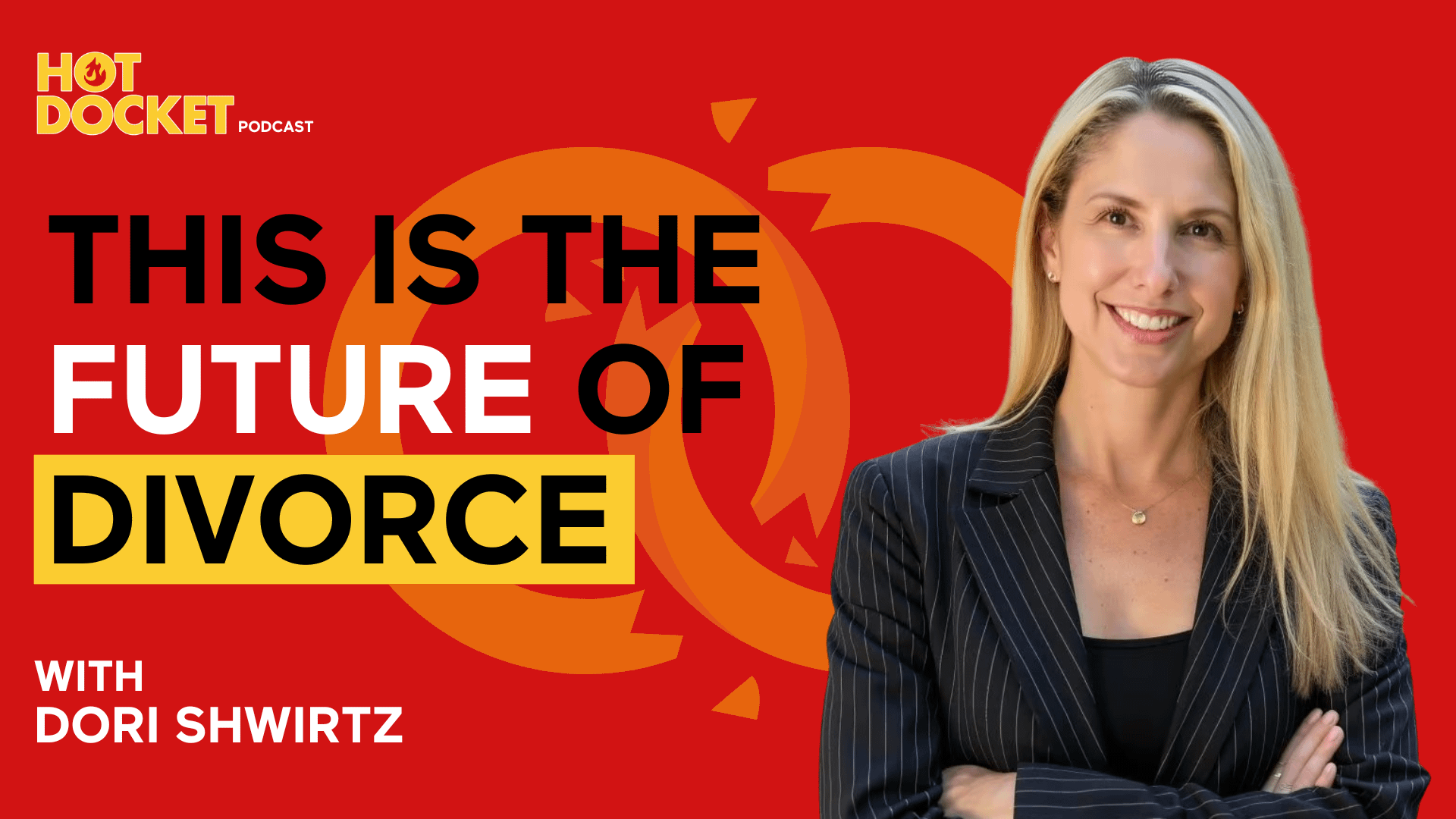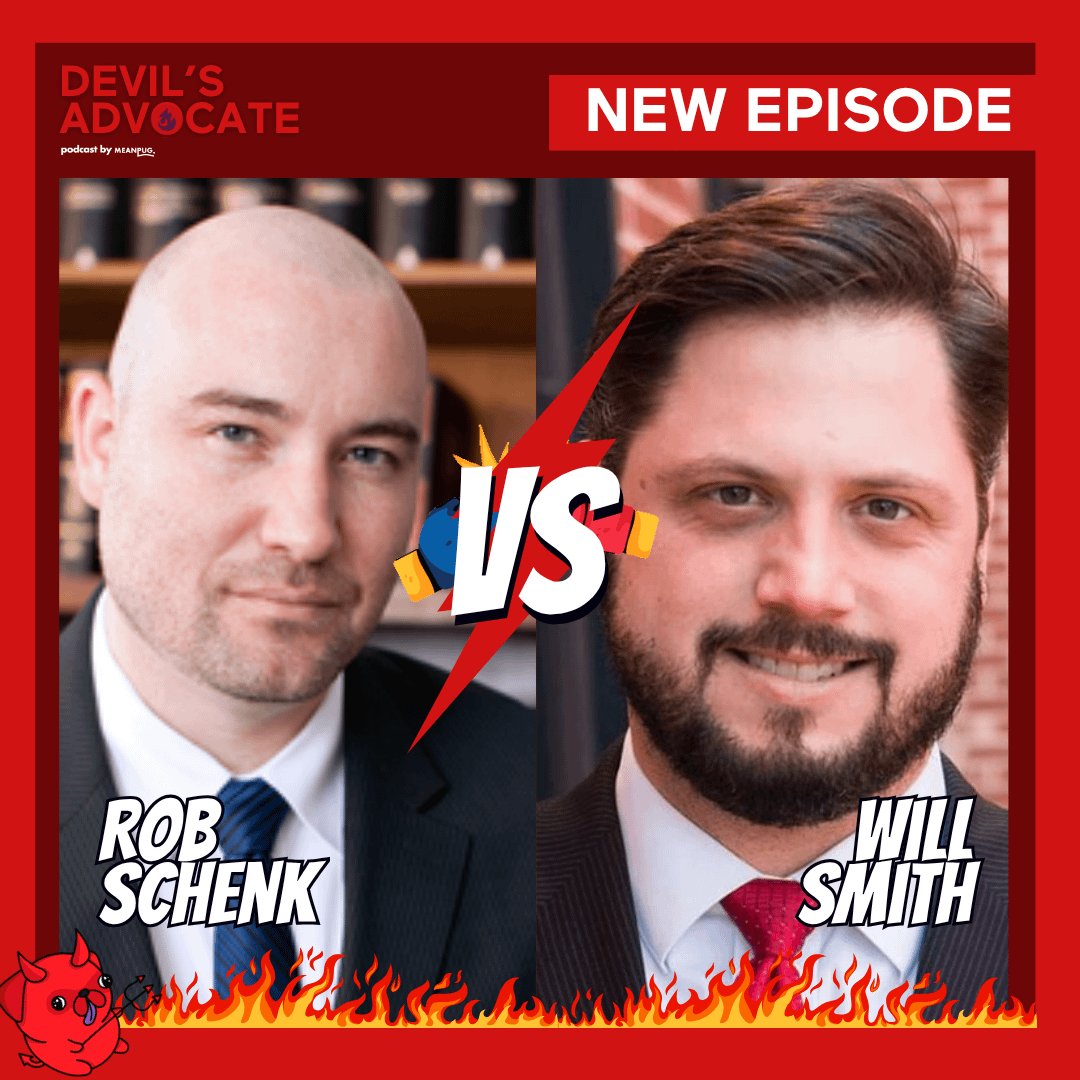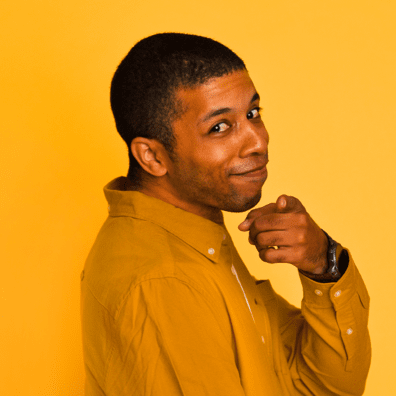[00:00:00] Dori Shwirtz:
And a lot of my clients are second divorces because they did it the other way the first time. And you know, they saw how hard it is and how much money they had to shell out. So they decided to go the uncontested route the second time around.
[00:00:15] Bobby Steinbach:
Welcome to Hot Docket, the show where we talk about winning marketing strategies that have built the most successful law firms.
[00:00:20] Andrew Nasrinpay:
Join us every two weeks for the latest trends and tactics to grow your law firm. Alright, welcome to the Hot Docket Podcast. Today we've got Dory from Divorce Harmony, and I think today we're gonna be talking primarily around, uh, mediation and uncontested divorces.
[00:00:37] Bobby Steinbach:
This is really, I think, the one family law topic we have not at anybody on to talk about.
[00:00:43] Bobby Steinbach:
We've talked. I think in either the last, um, conversation we had with a family lawyer or the one before, we talked about these different personas of family lawyers where, you know, some just want to like make the other side pay and the other want to be super compassionate and like keep the kids kind of secure and not put them on through like deposition or on on the stand for, to expose things about her.
[00:01:09] Bobby Steinbach:
So everyone kind of has a style I think for mediation. It, I. It's probably different than all of those, so I'm pretty curious to see, you know, how Dory can enlighten us.
[00:01:26] Andrew Nasrinpay:
Yeah. Do you, do you wanna start by kind of giving us your background and how you started, uh, divorce Harmony?
[00:01:32] Dori Shwirtz:
Sure. Um, well I was in law school a while ago, long time ago, and, um, I don't know, it really wasn't for me. Um, I wasn't the typical. Lawyer, uh, I don't think I fit into that mold. And I practiced for a few years, um, in New York actually.
[00:01:51] Dori Shwirtz:
And then, uh, stopped, went into a completely different field, funny enough, the diamond industry helping people, um, when they were getting engaged. So kind of the opposite of what I'm doing now. Um, and then I had four kids along the way, and then about, I don't know, eight years ago, um. I decided I wanted to try to do mediation.
[00:02:16] Dori Shwirtz:
Um, I've always loved talking to people, listening to people's problems, like really listening and, and trying to find, uh, solutions for, for people's problems. Uh, it's just something that I enjoy. So, uh, I started my practice and. It took me a long time to find that name, but I thought it was perfect. Divorce, harmony, uh, eHarmony did not like it.
[00:02:42] Dori Shwirtz:
They, um, actually had a problem with it, but I overcame that 'cause I explained to them that I am helping people divorce, not setting people up on a dating app. So, um, I was able to keep that. And even before Covid, I always knew I wanted to do these mediations. Via Zoom where uh, you know, you don't have to go anywhere and you can be in your own comfortable house or wherever and not have to even be with your spouse.
[00:03:12] Dori Shwirtz:
You both can be in separate locations. Just makes everything more relaxed and you're able to kind of think about things and make decisions at your own pace. Um, so that's what I've been doing and it's been really wonderful to help people, first of all, save sometimes six figures. By going to attorneys, we're really just figuring out things they're gonna have to figure out anyway if they went to court.
[00:03:36] Dori Shwirtz:
And it's, it's leaving the decision making power in, in their hands. And a lot of these things are so personal. Um, it's not things I really should be decided in court. If you can have two people that are willing to, you know, come together.
[00:03:54] Bobby Steinbach:
So what triggered you to reenter legal eight years ago?
[00:03:59] Dori Shwirtz:
I knew I wanted to do something.
[00:04:00] Dori Shwirtz:
My kids were getting older and it was always something in the back of my mind that I wanted to go ahead and try that. So I just took a, uh, you know, certification class in, in Florida, um, and then started, you know, sitting in on, on other peop other mediations, um, to get experience. And, you know, as the years have gone by, it's, it's been great.
[00:04:22] Dori Shwirtz:
Everything that I'm picking up along the way. Um, yeah.
[00:04:28] Bobby Steinbach:
When should people not do mediation?
[00:04:31] Dori Shwirtz:
So well, if you have, if you have a spouse that's not willing to, if you have someone that's abusive, uh, and or if you have someone that's hiding resources or you know, hiding financial information and you're not able to uncover that, uh, 'cause you both have to be completely transparent for the process to work and be able to make.
[00:04:55] Dori Shwirtz:
You know, clear decisions with all the information on the table. I always tell people, you're gonna have to produce that and more if you go to court, so you might as well be forthright. Um, but if, if, uh, the parties aren't agreeing to cooperate, that's obviously, um, not, you know, a reason not to do mediation.
[00:05:17] Dori Shwirtz:
But I would say. Most people can get to that point, um, to do it. And a lot of my clients are second divorces because they did it the other way the first time and, you know, they saw how hard it is and how much money they had to shell out. Um, so they decided to go the uncontested route the second time around.
[00:05:40] Andrew Nasrinpay:
How long does the average mediation process take?
[00:05:43] Dori Shwirtz:
Um, so you know when, when you think of mediation or like. Traditionally, you probably think about someone sitting in a room for eight hours or, I don't know, even longer. It's like a torture, uh, practice until everyone is in agreement. Um, so I don't do that.
[00:05:59] Dori Shwirtz:
Um, with the Zooms, all our meetings are max. Two hours at a time and then, you know, I'll do like a whole writeup of what we discussed and action items. Um, so we definitely first had that two hour meeting and then, you know, communication between, um, the meetings and, and then another meeting. So I would just say everyone's different.
[00:06:21] Dori Shwirtz:
Sometimes we can wrap things up in a few weeks and sometimes people wanna take their time for whatever reason, and it could be a few months.
[00:06:29] Bobby Steinbach:
Have you found that, um, like niching down into mediation has created new marketing opportunity? Like, maybe better yet, how are you currently getting your clients?
[00:06:39] Bobby Steinbach:
Like is referral a primary source for you or is it really just people searching on Google? Like walk us through? So
[00:06:46] Dori Shwirtz:
your
[00:06:46] Bobby Steinbach:
funnels
[00:06:48] Dori Shwirtz:
primarily, uh, it's more and more referrals. Thankfully, the longer I'm, I'm doing this, uh, but I do do, um. Google ads, Facebook ads. Um, when I first started, I tried to break into having mediations with other attorneys.
[00:07:10] Dori Shwirtz:
Um, that has not been my lane for whatever reason. I, people have always just used whoever they know, or retired judges, so I haven't really. Most of my mediations are with pro se um, clients. I don't who don't have attorneys, and I really enjoy that, but I wouldn't be opposed to working with attorneys as well.
[00:07:32] Dori Shwirtz:
Um, so yeah, that's how I get most of my, my clients from, uh, from the ads and from referrals.
[00:07:42] Bobby Steinbach:
But do you think that people. Come in knowing that they want to enter mediation or people of the mindset, I want a divorce. And you have to convince them that mediation is like the right path.
[00:07:52] Dori Shwirtz:
Most people that I come in contact with know what I'm doing and uh, they already know they want some kind of uncontested divorce.
[00:08:02] Dori Shwirtz:
Whether it's just me doing the paperwork or doing the mediation. 'cause I don't do any, I don't do contested, I don't represent either party.
[00:08:15] Andrew Nasrinpay:
Do you have a rough sense of what percentage of people go into mediation and it does not work for them and it just like boils over and becomes a bigger issue and they both hire attorneys?
[00:08:27] Dori Shwirtz:
Yeah, so I would say maybe like 15% of of my clients, and that's probably because one person didn't wanna do it in the first place or they're not ready because you know, both parties. Almost always, they're on different timetables. One person wants to be divorced yesterday and the other person maybe doesn't want the divorce.
[00:08:48] Dori Shwirtz:
So if they're not, it can be just, you know, that where it doesn't work out, um, and they're not ready to do it, or one person is unwilling to.
[00:09:00] Bobby Steinbach:
Shifting gears a little bit into like how you became this type of attorney. What type of traits do you think a new lawyer needs to have to be successful as a family lawyer?
[00:09:15] Dori Shwirtz:
Number one, just a, a good listener. Um, and patience and, and be able to separate the stress of the job from your own life and not let it affect, because you know you have people that are. Basically good people going through the hardest time in their life and they wanna have access to you at all times.
[00:09:35] Dori Shwirtz:
And maybe they don't have those boundaries because they're, you know, going through such a hard time. So you have to really be able to separate, um, what's going on with them and, and keep it out of your personal life. That's why so many people leave family a lot, I think. 'cause it's just very, it can be very difficult if you let it get to you.
[00:09:54] Dori Shwirtz:
So you have to be able to, you know, separate, um. From that and and com clinic compartmentalize that. Uh, when you're working,
[00:10:04] Bobby Steinbach:
I think we were talking to a criminal defense attorney, or maybe it was a state prosecutor, I don't remember which. And he was saying levels of alcoholism within legal is like one of the top three or four most.
[00:10:20] Bobby Steinbach:
Prevalent, yeah. Of any industry because it's just stressful. And I think every type of law might have a different version of that. Like people in criminal defense are seeing people who you know, are going through one of the hardest part, like times in their lives for a very different reason, right. Than somebody who is a personal injury lawyer, but still the same kind of underlying cause.
[00:10:43] Dori Shwirtz:
Yeah, definitely
[00:10:45] Bobby Steinbach:
not an easy job. So what advice would you have for folks who might be interested in, um, pursuing the path of like becoming a family lawyer? Is there a first step? Do you think they should, you know, go and, um, I don't know, work underneath like at a bigger shop? Or should they, do you think they can just go out and start their own thing as like a solo?
[00:11:09] Bobby Steinbach:
What's the best way to begin?
[00:11:11] Dori Shwirtz:
I'm all for starting your own thing. I think that's the best. I don't know, to be your own boss to, you know, make your own way and do things the way that you wanna do. If you can do that, and I think family law is a good kind of law to do that. You know, it's, you can start maybe get a little experience under your wing, but I think that for family law to start, you know, do something for yourself would be great.
[00:11:40] Dori Shwirtz:
Do it. Why?
[00:11:41] Andrew Nasrinpay:
Why do you think that is? Why do you think family law is like better, uh, than other areas of law to start your own shop earlier on in your career?
[00:11:51] Dori Shwirtz:
I, I just think 'cause you can do things your own way and, and your own philosophy and I have to answer to anyone else and, you know, kind of custom your practice the way that you want to do it.
[00:12:04] Bobby Steinbach:
How worried are you about AI taking your job? Yeah. Or not alone. It's
[00:12:08] Dori Shwirtz:
interesting. You know, I'm just starting to just explore different ways that it can actually help me. Um, yeah, probably one day. I don't know. Um, although, you know, I have a chat bot on my site, so I never, I always answer. If I don't answer, then I miss it.
[00:12:26] Dori Shwirtz:
So I just, they just offer this free AI robot to answer the, uh, the queries if I'm not there. But it's not so great. Like, it's not me. I guess I can maybe try to train it to be better, but I still don't think it takes the place of a human, but I think eventually could. Um, and I know even on like the Zooms, I haven't done it yet, but we, that they can, you can have AI kind of summarize your meetings.
[00:12:55] Dori Shwirtz:
Um. Yeah, I'm sure it'll replace everything eventually.
[00:13:01] Andrew Nasrinpay:
Yeah. I, I think it might be one of those areas where it has a hard time, like, uh, if two parties are unhappy, finding that middle ground is like a very human exercise. I, I do wonder
[00:13:14] Bobby Steinbach:
though, how much of it is protocol driven though? Like, I imagine most conversations probably start at what assets do you have?
[00:13:21] Bobby Steinbach:
You have kids. Do you have, like, is has there been abuse maybe or, yes. A lot of it is questions like that. Has there been criminal proceedings? And then you probably narrow down into each of these to like work out the nitty gritty. But I do wonder like, which steps of that are not, they're not checklist driven, but they are protocol driven.
[00:13:40] Andrew Nasrinpay:
Yeah. Yeah. But what, let's say it shoots out terms that would be reasonable. It's an, it's a time when someone is highly emotive. So even if it spits out results that I. It was the same thing a person may have done and said they one side is unlikely to agree to it because there's emotion involved.
[00:14:01] Bobby Steinbach:
So let's say it created this plan of action and you had Dory there.
[00:14:07] Bobby Steinbach:
I. To like interpret the results and act as mediator could all of her work. That is not like the human aspect of it be given to the machine or No,
[00:14:16] Andrew Nasrinpay:
it, it almost sounds like an oracle where she looks into a fire and it gives the results and she reads it out. I think it, I think some people are, the machine has spoken.
[00:14:24] Andrew Nasrinpay:
I think you
[00:14:25] Dori Shwirtz:
can use it as a tool. You could put things in and they can make a chart for you or like maybe for like time sharing when you have the different scenarios for the days of the week with the kids, it can really help maybe like, uh. Display different graphics. I think you could definitely use it as a tool, but um, I'm sure one day it'll take over.
[00:14:47] Dori Shwirtz:
I
[00:14:47] Bobby Steinbach:
dunno. Well, you need the human. I think what Andrew's saying and I agree with is you still need the human to interpret the results and like
[00:14:54] Dori Shwirtz:
explain it. Answer the
[00:14:55] Bobby Steinbach:
questions that people will naturally have from these results. Yeah. So it makes sense that you'd still be there regardless. Until there's, you know, I'm still doing a robot that has a human voice.
[00:15:07] Bobby Steinbach:
So then, then, then maybe, who knows?
[00:15:09] Dori Shwirtz:
Yeah. But
[00:15:10] Bobby Steinbach:
maybe this is like how, you know, Terminator starts, it begins with mediation,
[00:15:14] Dori Shwirtz:
right? Yeah, exactly.
[00:15:17] Bobby Steinbach:
I think, like for me, this pretty, pretty good stop stopping point. Um, I learned a lot about like the mediation process and who it's for, who it's not for, um. We learned that AI isn't coming for mediation anytime soon, hopefully, which is probably for the best.
[00:15:35] Bobby Steinbach:
Um, and yeah, Dory, we're gonna have links to, uh, all your sites, divorce, harmony, not eHarmony. We'll have those listed below. Anything that, um, our listeners, you know, should pay special attention to. You have anything coming out or anything like that?
[00:15:54] Dori Shwirtz:
No, just really working hard on, you know, the divorce mediations I am doing now, postnuptial agreements a lot and prenuptial agreements as well.
[00:16:03] Dori Shwirtz:
Um, yeah.
[00:16:06] Andrew Nasrinpay:
Do you find that a lot of people put in the prenups, in the postnup that they want to like, bind to mediation or, or is that not a thing?
[00:16:17] Dori Shwirtz:
Uh, no, that's not really a thing.
[00:16:22] Andrew Nasrinpay:
All, it seems like it would be like, wha wha like a good pass. If would've avoid it, I should
[00:16:27] Dori Shwirtz:
do it for my postnuptial. 'cause usually the people that are doing postnup, they probably want to get divorced, but they're just not ready to pull the trigger.
[00:16:34] Dori Shwirtz:
Um, but then they become divorced clients a little later after they've sat on it. Interesting.
[00:16:40] Bobby Steinbach:
Yeah. Yeah. You've probably got like an interesting. You know, email newsletter strategy there where you just keep those people? I don't have newsletter
[00:16:47] Dori Shwirtz:
because I don't, I don't know. Should you have a divorce newsletter?
[00:16:50] Dori Shwirtz:
Like
[00:16:50] Bobby Steinbach:
it's hard. Probably.
[00:16:52] Dori Shwirtz:
I don't think it's talking. Probably
[00:16:53] Bobby Steinbach:
maybe not. We have a client, a family law client who I think I had a similar idea to this and he was like, no, we're never gonna do that because, um, like. These people, let's say the spouse reads the email Yeah. And is like, you're getting a divorce.
[00:17:11] Dori Shwirtz:
I know. And I always feel bad with like retargeting. Like if, if you know, one spouse is looking up divorce mm-hmm. Another person, why am I getting all these divorce ads?
[00:17:19] Bobby Steinbach:
Oh, I don't know. Yeah, you could probably, there's probably a world where you like that person gets gaslit. Like, why are you searching for divorces nonstop?
[00:17:27] Bobby Steinbach:
Why does Google know you want a divorce? Uh, but yeah. Cool. This was great. Thanks for coming on, Dorie. We hope you've enjoyed this episode of Hot Docket. We're your hosts, Bobby and Andrew, founders of Meme Pub, the marketing agency for ambitious law firms.
[00:17:42] Andrew Nasrinpay:
Have questions about marketing or anything we covered today?
[00:17:45] Andrew Nasrinpay: Email us at Bark@MeanPug.com.











